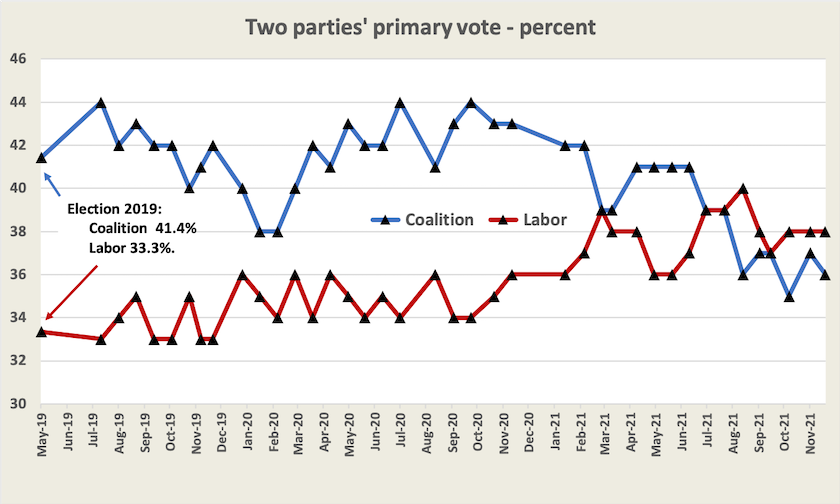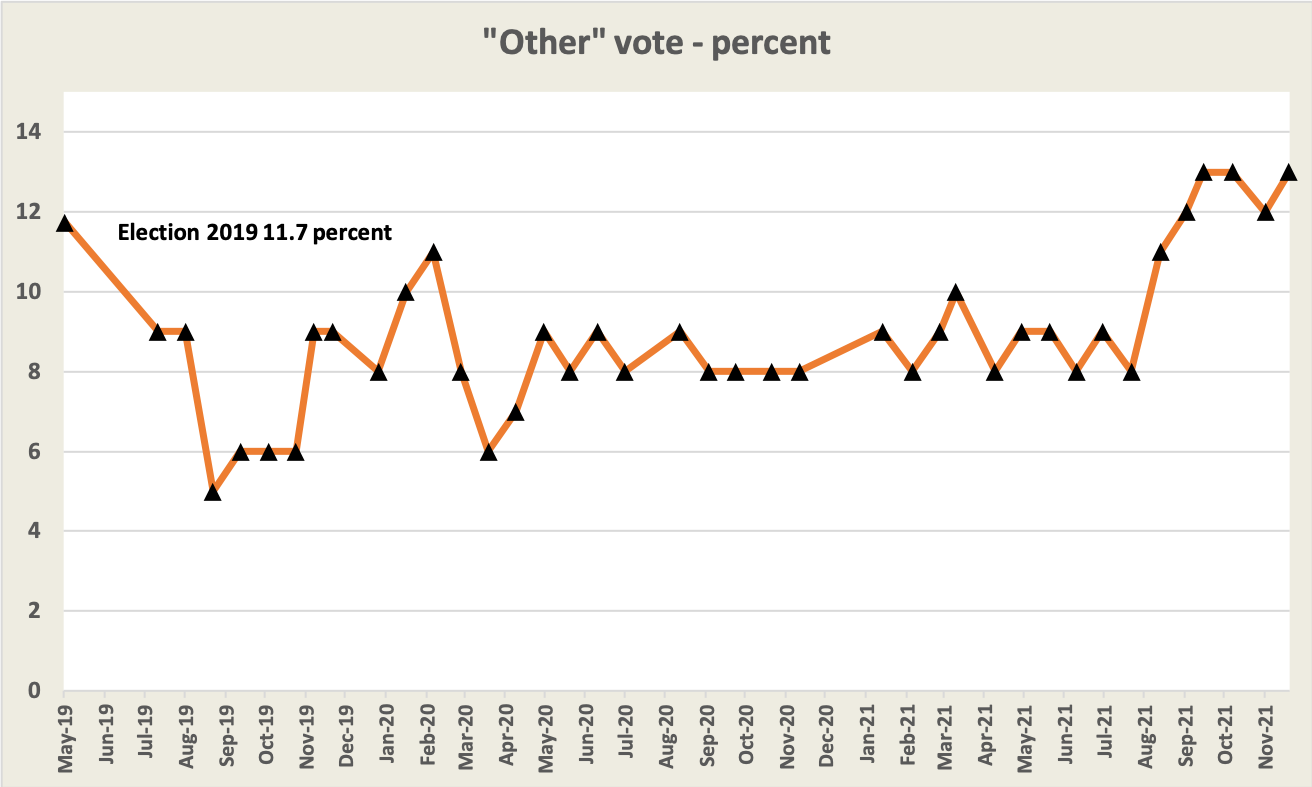Polls and surveys
Newspoll: it’s still all about independents
The latest Newspoll, summarised on William Bowe’s Poll Bludger site, suggests that there hasn’t been much change in support for Labor or the Coalition since midyear. Labor’s primary vote is about 38 percent (up 5 percent from the 2019 election), and the Coalition’s is about 36 percent (down by 5 percent).

The absence of net movement in the last two months suggests that the Coalition’s run of scandals and disastrous parliamentary performance has not shifted support for the two main parties: maybe the Coalition is down to a hard core of supporters. Support for “others” – other than Coalition, Labor, the Greens and One Nation – is up, however. A quick glance at the graph below suggests that it is only a little above its level at the 2019 election, but national opinion polls don’t do a good job at picking up support for independents and microparties. Because of this bias Newspoll probably understates their support.

Adrian Beaumont, writing in The Conversation, suggests that there has been waning support for Labor in the last two months: Labor maintains clear Newspoll lead, but there’s been an overall shift to the Coalition since October. He cites other polls that show very tight results, including a Resolve poll suggesting an election today would have almost the same outcome as the 2019 election.
Then there is the Essential Political Insights Poll, in its new format, finding, in mid-November, 36 percent support for Labor and 37 percent support for the Coalition – pretty close to the Newspoll. Unlike other polls it also surveys people on support for Palmer’s UAP, which has been hovering between 2 and 4 percent lately, and which seems to have been gaining while support for One Nation has been falling. Support for these two parties combined is around 4 to 6 percent.
Essential also provides readers the capacity to look at disaggregations by gender, region, and workforce status. They are neat presentations, but each disaggregation increases the relative error. Because there would be roughly an equal number of men and women surveyed, disaggregation by gender is probably prone to the lowest error. There is a clear and significant gender gap between how men and women would cast their votes if an election were held today: Morrison must be regretting that women ever won the right to vote. There is also strong evidence that older people (55+) have hardly budged in their strong support for the Coalition, while young people (<35) have moved strongly towards preferring Labor.
Essential’s regular poll
The December 7 Essential Report surveys opinions on ICAC and Covid-19 policies.
People are asked what powers a federal ICAC should have. Unsurprisingly Coalition supporters are less enthusiastic than Labor supporters about a powerful ICAC. Supporters of minor parties and independents are particularly keen to see a strong ICAC. Coalition voters are much more likely than supporters of other parties to agree with Morrison’s description of the NSW ICAC as a kangaroo court that hounded premier Berejiklian out of office.
On pandemic politics, people are becoming less enamoured with their state governments for their Covid-19 responses, but they’re still doing better than the Commonwealth.
Only 5 percent of respondents are in the “I’d never get vaccinated” camp, down from 10 to 15 percent earlier in the year, but among those voting for “other” (other than Labor, Coalition or Greens) the figure is 16 percent.
In all there is little sympathy for those who choose not to be vaccinated against Covid-19: 55 percent of respondents agree that unvaccinated people should be required to pay for their own hospital costs if they contract Covid-19, and 61 percent of respondents believe it should be compulsory for all adults to be vaccinated against Covid-19 unless they have a medical exemption. In spite of Morrison’s talk about resisting compulsion, 69 percent of Coalition voters agree with compulsory vaccination.
There are a couple of questions about whether we should prioritise third vaccine doses for ourselves or initial doses for people in developing countries, revealing no strong preferences, but most of us (74 percent) understand that “until there are high vaccination rates in all countries, Australia will always be at risk of Covid-19 variants and outbreaks”.
On all the statements on vaccination, older people are generally more in favour of strong policies than younger people.